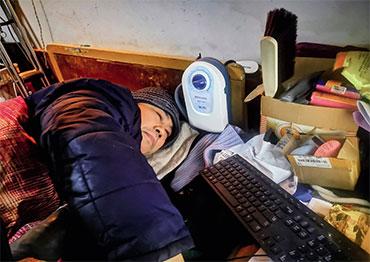Standing on Zhang Dayong’s balcony in Luoyang, Henan Province, one can breathe fresh air and feel the warm sunshine. In the distance are high-rise office buildings surrounded by trees.
It is hard for Zhang to appreciate the view. Suffering from ankylosing spondylitis (AS), a type of arthritis that inflames the joints of the spine, Zhang, 57, has been bed-ridden for three decades. For the first 17 years, his view was only a white roof and wall. Although he later could stand for a while with crutches after two operations, he no longer feels a connection with the outside. He told NewsChina that he had been outdoors less than 10 times in the past 30 years.
Yet he has still managed to travel, journeying to southern China with the help of volunteers on a quixotic quest to collect information for his website, which aims to identify China’s John and Jane Does. It is the country’s only private database to attempt to collate disparate information in a central database that people seeking missing relatives can refer to. Zhang said his website helps connect him to the outside world, and he hopes it helps families find missing relatives.
“Connecting nameless bodies with their families is what we do to soothe the living and lay the deceased to rest,” reads the homepage of Zhang’s website, the National Unidentified Dead Database (www. wmsz.net), which he started in 2012.
“My website aims to enable people to search for the missing from home. It will greatly reduce a family’s cost in their search... and it’s helpful to law enforcement, as it costs a lot if a body remains unidentified for a long time,” he told Democracy and Law Weekly in a 2019 interview.
Zhang’s computer is in easy reach beside his bed. He devotes most of his time to the website, his self-imposed mission that drives him to seek information on search engines like Baidu, social media platforms like Weibo and WeChat, and police and civil affairs bureau websites, which he sorts through then posts on his own site.
Zhang’s website hosts more than 4,000 bits of information about unidentified bodies, with nearly 200 messages on the bulletin board asking for assistance to locate missing relatives.
“About 500-600 IP addresses log onto my website every day, and they each browse about 20 web pages on average... It indicates there are 500 people searching for missing people on my website every day,” Zhang told NewsChina.
Zhang’s interest in searching for crime victims was sparked in the winter of 1997, after his mother told him that she had seen the body of a woman in front of their building. She said the woman was wearing a red sweater and showed signs of being burnt.
The next day, Zhang saw on the news that a man from a nearby county was looking for his wife who had left home after a quarrel. From the description, he suspected the man’s wife was the body his mother saw in their community. He asked his brother to contact the man, who confirmed her identity.
With a keen interest in data, Zhang’s first dream was to make a Chinese version of the Guinness [Book of] World Records, and he had already started the project before he fell ill. Diagnosed with AS in 1981 at just 17, he became paralyzed 10 years later and felt so depressed that he considered suicide.
“I didn’t dare fall asleep – I was afraid he’d kill himself,” Zhang’s mother Wang Yuping told NewsChina. Thanks to her love and his strong will, Zhang pushed his suicidal thoughts aside. The second year he was bed-bound, he decided to continue with his dream of what he called the “Chinness World Record.” It took him 10 years to read and compile information from piles of newspapers his mother collected from garbage dumps, about 10 tons in total.
It took him seven years to finish the “Chinness World Record” – his name, which he copyrighted and registered with the patent bureau. There is a website, and people who think they have broken a record can apply online for recognition.
As he went through his newspapers, he saw many notices appealing for information about missing people. Many were students who had run away from home. He saved all the notices, planning to put them together in an exhibition to alert people.
One day in 1998, Zhang read in a Xinhua News Agency report that the National Center for Missing & Exploited Children in the US had started a website. Zhang was inspired and thought China should have one too. He asked his brother Zhang Xiaoyong, who had some IT skills, to build the site in 2001, and Zhang took charge of design and data collection.
Computers were still new in China then – there were less than 20 million internet users in the entire country. Jack Ma’s Alibaba had only been operating out of a small apartment for two years at that time.
Media coverage in the same year helped Zhang’s website become popular. By the time he closed it down in 2007, after a proliferation of similar sites rendered it obsolete, he had helped reunite 300 families with missing relatives.
The website helped Zhang too. “I felt like an isolated island without anyone to talk to until I started the website. It connected me to the outside,” he told NewsChina. The popularity of the website also helped, allowing him to receive some financial assistance to do his work.
Before his missing persons website closed, he had started adding information about John and Jane Does. After it shut down, he decided to continue collecting information on unidentified bodies.
Collecting information about unidentified bodies in China is much harder than for missing people, since information is kept by police, civil affairs bureaus and government-backed mortuaries that do not usually provide information to individuals.
Although Zhang tried hard to contact official organizations, only a few agreed to give him information. If they did, it was because when he called they had an open case and welcomed the extra help.
In 2011, Zhang wrote to Donald Tsang, who was then the chief executive of the Hong Kong Special Administrative Region, asking him how the city dealt with unidentified bodies. He was surprised when Tsang’s private secretary forwarded his letter to the Hong Kong Police Force which replied that the city has a special investigation team for missing people and there were only 10-20 bodies every year they are unable to identify.
Zhang was reenergized after the reply from Hong Kong. He wrote to Party secretaries and directors at more than 10 provincial civil affairs bureaus for help in collecting information, but none replied.
“I was too naive at that time... I should have asked for information in person,” he said.
Later in 2011 Zhang received a boost when he received funding from the China Communist Youth League and China Mobile after he submitted a proposal to collect information on unidentified bodies along the route of the Olympic Torch Relay, which traversed China in 2008 prior to the Beijing Summer Olympics.
At the end of the year, Zhang, with the help of volunteers, began the first part of his journey, covering Guangzhou and Shenzhen in South China’s Guangdong Province and Nanchang in neighboringJiangxi Province. The journey was tough – he had to go to the emergency room on arrival in Guangzhou. Then media reports revealed that he had not eaten or drunk on the long train ride because he did not want to trouble his helpers. Still, he collected enough information to start his website in 2012, China’s first private database for unidentified bodies. The website is non-profit, as Zhang fears people will criticize him for profiting off the dead.
Although new information about unidentified deceased people comes every day – except during the pandemic – only a few have been identified through his website.
“Over the past eight years, about 30 people told me they’d found a missing person thanks to my website,” he said.
There is no official count of unidentified bodies in China beyond incomplete local records. According to Chinese media reports, unidentified bodies are kept in hospital mortuaries or funeral homes. Southern Metropolis Daily reported in 2015 that Guangzhou Funeral Parlor receives about 1,000 unidentified bodies every year, one-fourth of which remain unidentified or unclaimed.
In his thesis about identifying bodies published in the Journal of the Hubei University of Police in 2011, Feng Xin, a scholar at the People’s Public Security University of China, wrote that an unidentified body will not be cremated until it is identified and claimed, meaning that some bodies can be kept for years.
“Morally speaking, people won’t accept a body being cremated before identification,” Feng told NewsChina.
But it is costly to keep bodies for extended periods. The Southern Metropolis Daily report said that it costs the city of Guangzhou 5 million yuan (US$772,582) a year on average to deal with unidentified bodies.
Feng attributed the difficulty in identification to the disconnect between local management systems for missing people and unidentified bodies. Lack of information sharing makes collecting cross-regional information laborious and expensive.
Zhang agrees. In an article soliciting volunteers and sponsors for subsequent journeys to collect information, he wrote that authorities have hotlines and websites for missing people and have established databases to reunite missing or kidnapped children with their relatives. However, these databases are neither linked nor available to the public. Zhang said this makes it difficult and costly for families to identify missing relatives, especially since there are such huge flows of people moving across the country now.
Zhang spoke of an elderly Luoyang man who continues to search for his missing wife even after visiting every funeral home in 18 cities in Henan Province.
Zhang laments that his website is not as useful as he intended, as it is ignored by officials and remains largely unknown to the public.
“During the first phase of my journey, I visited over 100 offices and departments, but few gave me information... it’s a very obscure charitable activity and we cannot force people to support us,” he told Democracy and Law Weekly.
“I’m even not sure I can make the second phase of my journey,” he added.
Zhang hopes that the government departments will implement laws for body identification – China’s prevailing Mortuary Regulation contains no clause for unidentified bodies, and also legislate to empower more people and organizations to engage in the field.

 Old Version
Old Version
